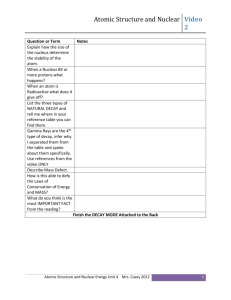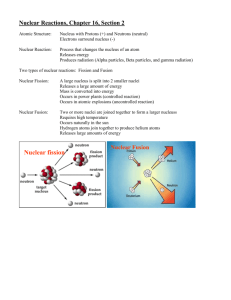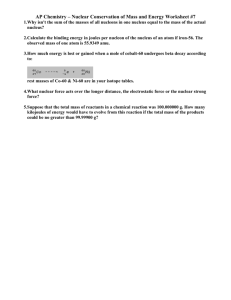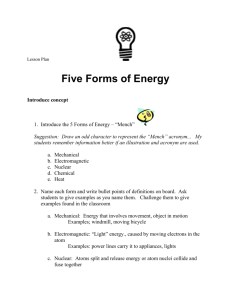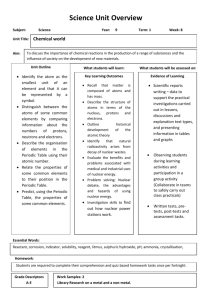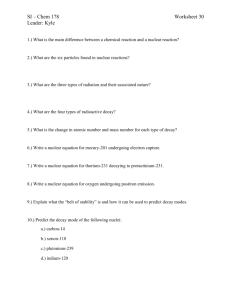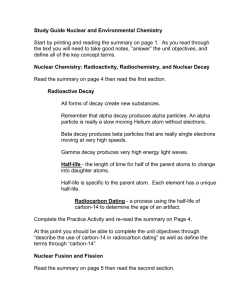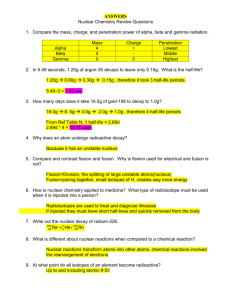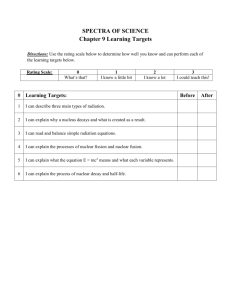Nuclear chemistry quiz
advertisement
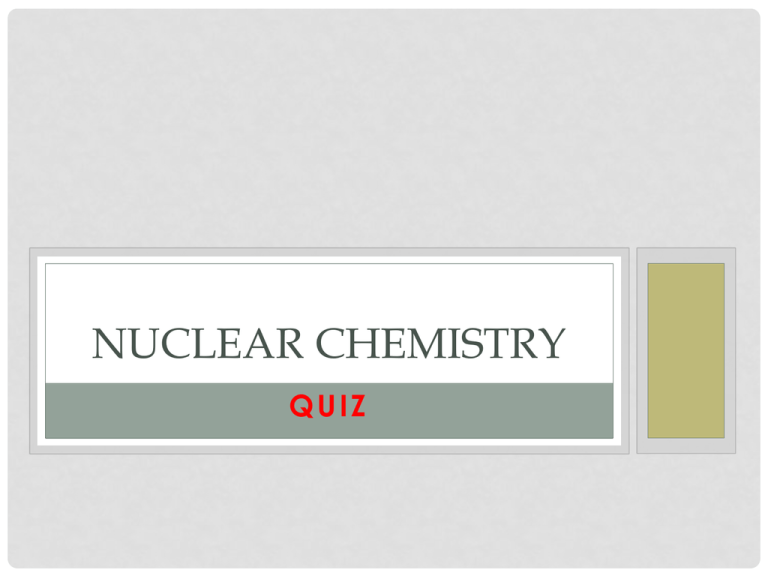
NUCLEAR CHEMISTRY QUIZ NUCLEAR CHEMISTRY QUIZ 1. Compare what happens to atoms in both a chemical reaction and a nuclear reaction. 2. What happens to the energy levels in a nuclear reaction? 3. The rate of a nuclear reaction is affected by temperature, particle size, and concentrations...True or False? 4. Fission and fusion processes deal with ________ and ________. 5. Nuclear reactions deal with interactions between the _________ of _________. 6. Define fission. 7. Define fusion. 8. What type of atoms are used in the fission process? 9. What type of atoms are used in the fusion process? 10. Define radioactive decay. NUCLEAR CHEMISTRY QUIZ 11. 12. 13. 14. 15. 16. 17. 18. 19. 20. What are nucleons? What is an isotope? Write the isotopic notation for uranium-235. The _________ number tells you the number of protons in the nucleus of an atom. The _________ number tells you the number of protons and neutrons in the nucleus of an atom. Write three characteristics of alpha decay. Write three characteristics of beta decay. Write three characteristics of gamma decay. Write the nuclear equation for the electron capture of potassium-40. Write the nuclear equation for the beta decay of iodine-131. NUCLEAR CHEMISTRY QUIZ 1. Compare what happens to atoms in both a chemical reaction and a nuclear reaction. In a chemical reaction, atoms are only rearranged and in a nuclear reaction atoms will change into other elements. 2. What happens to the energy levels in a nuclear reaction? Large energy changes 3. The rate of a nuclear reaction is affected by temperature, particle size, and concentrations...True or False? False 4. Fission and fusion processes deal with matter and energy. 5. Nuclear reactions deal with interactions between the nuclei of atoms. NUCLEAR CHEMISTRY QUIZ 6. Define fission. Process of splitting an atomic nucleus into fission fragments. 7. Define fusion. Process in which two light atomic nuclei fuse or combine to form a single larger, heavier nucleus. 8. What type of atoms are used in the fission process? Heavy atoms with large number of nucleons. 9. What type of atoms are used in the fusion process? Light atoms. 10. Define radioactive decay. Process in which an unstable atomic nucleus loses energy by emitting radiation in the form of particles or electromagnetic waves. NUCLEAR CHEMISTRY QUIZ 11. What are nucleons? Particles found in the nucleus of an atom (protons and neutrons). 12. What is an isotope? Atoms of the same element with different number of neutrons. 13. Write the isotopic notation for uranium-235. 14. The atomic number tells you the number of protons in the nucleus of an atom. 15. The mass number tells you the number of protons and neutrons in the nucleus of an atom. NUCLEAR CHEMISTRY QUIZ 16. Write three characteristics of alpha decay. Weakest, stopped with a piece of paper, particle is a helium atom, etc. 17. Write three characteristics of beta decay. Stopped by Al, stronger than alpha, gives off a negatively charged particle, etc. 18. Write three characteristics of gamma decay. Energy/wave (not a particle), strongest of all, can be stopped with lead, etc. 19. Write the nuclear equation for the electron capture of potassium-40. 20. Write the nuclear equation for the beta decay of iodine-131.
